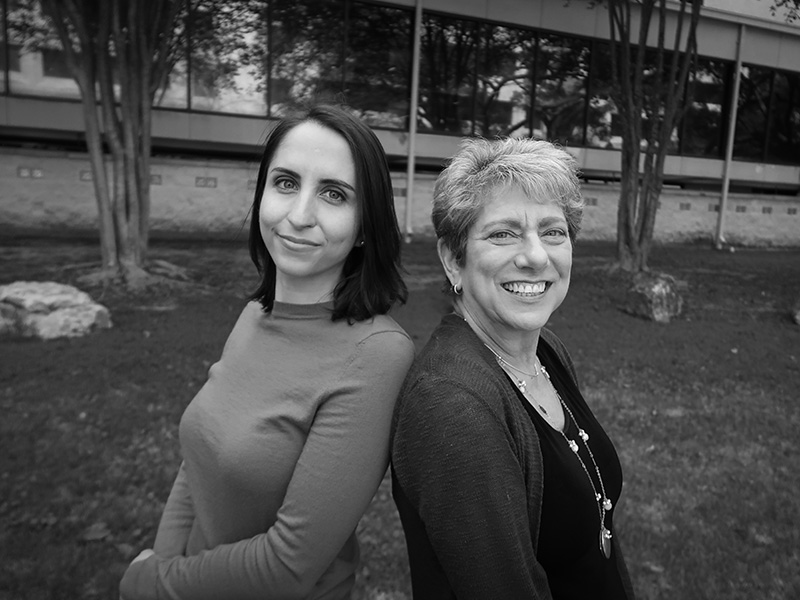Yasmin Chebaro, PhD & Leslie Beckman

Yasmin Chebaro, PhD (left)
Program Manager, Office of Postdoctoral Affairs
Leslie Beckman (right)
Assistant Director, Office of Postdoctoral Affairs
At the beginning of the pandemic, our commute to campus was paused, but our services to UTHealth postdocs and faculty continued. We knew we were not going to stay at work as our office is across the hall from the Infectious Disease lab. They needed all the space possible, and they were there 24/7. While we had to adjust to a new home office and figure out what to do with our Postdoc Training Program, of utmost concern was how were we going to offer comfort to the postdocs whose research would be jeopardized if they were unable to be in their laboratories. They could potentially lose years of training, hard work, not to mention the loss to future science.
While there is much to consider here are two of the major challenges and our solutions:
Challenge 1: We were mid-semester in three in- class courses each with unique issues. How would postdocs give their talks in the Presentation Skills course? The NIH requires Responsible Conduct in Research training to include case studies and small group discussions. And then the very difficult to teach Data Science course was going to be tricky without an expert instructor “in the room.” We were confident we could transition to a virtual platform, but we needed features that WebEx was not yet offering. We did our homework and transitioned our classes to the Zoom format. Yasmin and I attended webinars to learn how to use the features, including how to be engaging on Zoom training sessions. It worked! And, it worked well enough that we were able to include our postdocs from Austin into our programs. We plan to continue that offering, and the faculty and staff in the remote locations are very grateful.
“Being able to adapt and pivot was key to our services to others and our personal sanity.”
Challenge 2: UTHealth was the only major institution in the TMC to not completely shut down the labs. While there was much uncertainty at first, we sprinted into action. We worked closely with Administration and Departments to ensure shifts were being adhered to and that postdocs were feeling as safe and comfortable as possible with their new schedule. We leveraged our relationship with Employee Assistance Program leaders and the UTH Academic Ombuds office. Seminars were offered on stress management, meditation, and resiliency. We started a weekly meeting with our colleagues in the Postdoc Offices at Baylor and UT MD Anderson Cancer. We offered each other participation in postdoc webinars, including a host of virtual programs for National Postdoc Appreciation Week. We have even extended our outreach to HMRI, UH, and Rice to hold our annual postdoc career symposium in May 2021 using a virtual platform.
I believe there are two significant Lessons Learned from 2020 that will serve us well into future endeavors. First, is the immense value of our relationships with others. Our hard work cultivating professional and personal rapport with UTH and TMC stakeholders. Be it faculty, DMOs and admins, EAP/Ombuds, IT, and many others working together, we were able to be of service to our postdoc community. Second, is the importance of being resilient. No one was prepared for a yearlong plus pandemic that would change life in every aspect. Being able to adapt and pivot was key to our services to others and our personal sanity.
